
Hope your Christmas was amaaaaaaazing. Now it’s time to hit 2024 running. The first four people who e-mail me – carsonreeves1@gmail.com – and mention the HOLIDAY DEAL get 4 pages of notes for half-price!! Your script does not have to be ready yet but you do have to pay now to get the deal.
In the interim, I’m trying to write a newsletter before the end of the year, mainly because I want to talk about how good Wonka was. This movie, and screenplay, were freaking amazing. It might even be number one on my Best Movies of 2023 list. I’m just too lazy to go back in there and move everything around. :)
I also want to theorize on whether this is the year Netflix becomes Blackberry. I’m not talking about the movie. I’m talking about Netflix following the same path of Blackberry, into oblivion. There are a couple of huge things happening in the industry this year that may precipitate the fall of the streaming giant.
Then, again, I’m also trying to clean my freaking place so it’s spic and span for the new year. So who knows which will take precedence (good news for Shadowers – when confronted with these challenges, writing for the site usually wins).
Oh, and thank you to everyone who contributed movie suggestions to my Top Movies of the Year post. The movies getting mentioned the most – and therefore you should check out this week – are…
Wonka (Carson pick)
Anatomy of a Fall
Saltburn
Sisu
Iron Claw
The Holdovers
The Equalizer 3
TALK TO YOU SOON!
 Did Mario make the list???
Did Mario make the list???
I’ve got some devastating news for y’all.
This might be THE LAST POST OF THE YEAR.
Then again, maybe not. Maybe I get nostalgic and post something tomorrow. Or the next day. You never know with the wackadoodle running this site.
But I will say this. I’m excited to share my top 10 movies of the year. This year started out shaky but made a noble comeback towards the end.
I don’t want this to only be a thread discussing my favorite movies. I want you guys to discuss your favorite movies as well. I’m particularly interested in movies that weren’t on anybody’s radar. Collectively, we can come up with a handful of gems that we all get to watch over the holidays.
Before we get to the best movies of the year, I must mention the movies that fell outside my top 10. The biggest one is Oppenheimer. I thought it was an okay movie that fell apart when it rambled on for an extra 45 minutes after the bombing. Also, for a movie that spent its entire running time focusing on one person, I was shocked at just how little I knew about Oppenheimer when it was all over. With that said, I liked it better than Killers of the Flower Moon, which had an even weaker narrative structure.
Both Across The Spider-verse and Guardians 3 were solid superhero movies. But I had enough issues with each that they landed outside my Top 10. Then there was another solid movie in John Wick 4. But the director needs to learn that action movies are slim, not bulky. A 110 minute version of John Wick 4 could’ve been awesome.
The Equalizer 3 was sneaky good and almost made my Top 10. I haven’t seen Napoleon. Air was pretty good but I was let down by Ben Affleck’s rushed direction. The script was much better. The Creator looked beautiful but Gareth Edwards desperately needs a writer. The film’s narrative and point were too muddled. I haven’t seen The Holdovers, Godzilla Minus One, or Saltburn, all of which, I’m assuming, would have had a shot at my Top 10.
Okay, are we ready for the DEFINITIVE Top 10 Movies list of the year? Let’s get to it.
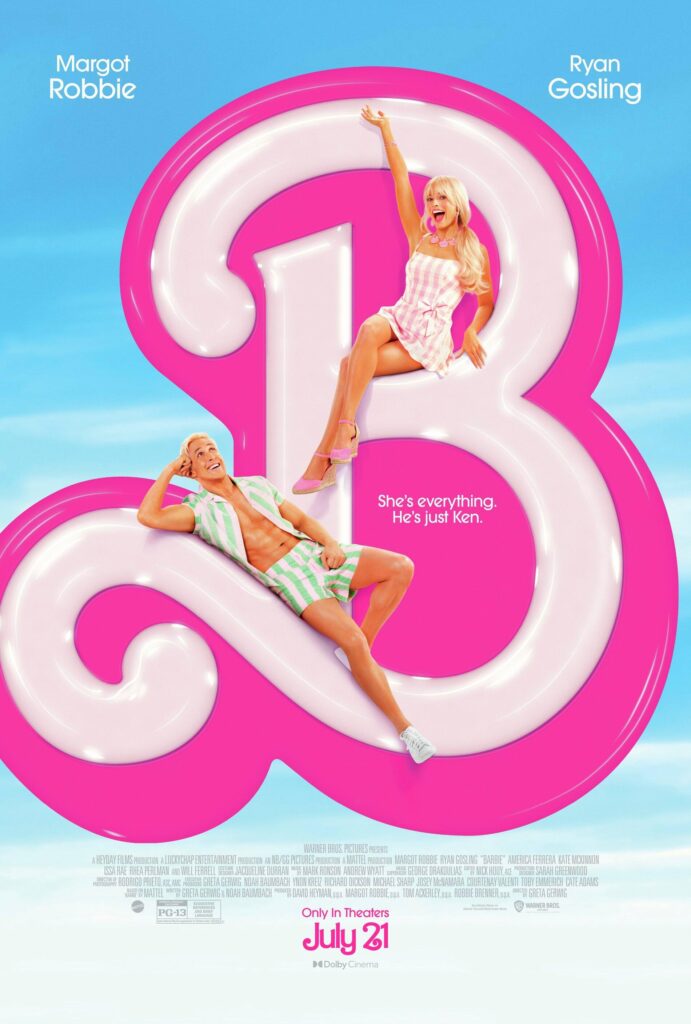
NUMBER 10 – BARBIE
This is a shocker to some of you. It’s a shocker to me too. But the more I thought about it, the more I realized you can’t tell the story of 2023 Cinema without talking about Barbie. But it’s more than that. While I didn’t agree with the message of the film, I admire what the writers did from a screenwriting perspective. This may be the best example of writers infusing genuine depth into a studio film in over a decade. It is NOT EASY to do what Gerwig and Baumbach did. They made a mainstream movie with indie sensibilities and it resulted in the movie making MORE money than it would’ve if they went 100% mainstream. The character of Ken still resonates in me today. Gosling is iconic in the role. And you know what I think the secret sauce was here? This is the first time in forever that a studio made a big IP movie without a franchise in mind. Gerwig and Robbie just wanted to make a singular great film. Because they didn’t have to leave any open threads, they ensured that the movie stood on its own.

NUMBER 9 – THE KILLER
How bout that for a contrast in entries? The most feminist film of the year back to back with the most masculine film of the year. If that doesn’t prove that I have eclectic taste, I don’t know what does. The Killer got some pushback when it came out and I’m still trying to figure out why. It was an awesome movie. Not only did it deconstruct the John Wick formula. But it was buoyed by the amazing direction of Fincher (that fight set piece was INSANE!). It felt nastier, grittier, and more realistic, than all these slick over-produced John Wick clones. And, as I covered in my review, I loved the way they sequenced out the scenes into mini-movies, all with their own beginning, middle, and end. I’m guessing people may have been expecting something more complex from Fincher and were therefore disappointed in the simplicity of The Killer. But I thought it was great.

NUMBER 8 – THE FLASH
I loooooooooved this movie. To me, this film is a prime example of media manipulation of the audience’s expectations. The media went above and beyond to make this movie feel “less than,” and, as a result, people went in with their 2-liter bottles of haterade and came out urinating those thoughts all over the internet. But if you distance yourself from the narrative and see this movie for what it is, it’s a really good movie. The main character is likable. The concept (two Flashes working together) is fun. Bringing in Batman added a whole other element of excitement into the mix. Literally the only thing wrong with the movie is that Warner Brothers stopped putting money into it when the PR went south. So you have these weird unfinished effects scenes. But that just goes to show how good the movie was – that it could withstand that. This is the best superhero movie of the year and it’s not even close.
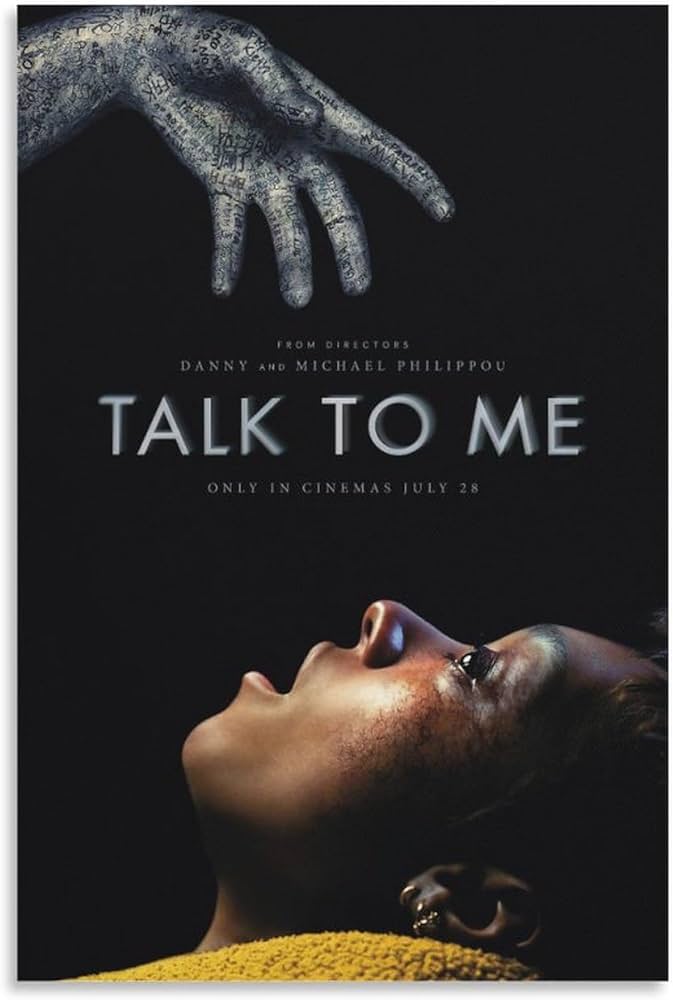
NUMBER 7 – TALK TO ME
I think this movie taught me the secret to horror. It contains 3 steps. One – simple premise. In this case, a cursed hand that makes you see dead people. Two – make it scary. It’s obvious but make sure the scares are legitimate scares. I read too many horror scripts where the scares are unoriginal and tame. You gotta push the envelope and be legitimately scary. And three, put an actor or actress in the lead role who we love. The actress in this movie was amazing. She’s going to be a gigantic star. Something about her eyes pulled you in and didn’t let you go for the entire running time. The script has a few issues. The narrative isn’t the tightest. But it makes up for it in the direction and acting. It’s a really fun little movie.

NUMBER 6 – POOR THINGS
What surprised me the most about Poor Things was that I thought it was going to be a directing showcase only. That there would be no script to speak of. I was dead wrong. Like I pointed out in my review, the movie follows The Hero’s Journey to the T. It is as screenplay-ish a movie as there is on this list. It’s also a movie that takes a lot of chances and challenges some of the narratives in Hollywood right now, which I found refreshing. It’s almost like the anti-Barbie. Just like Barbie, it has an awesome male character, this time in Duncan, who may be the funniest character in any movie this year. Whenever he had one of his temper-tantrums, I couldn’t stop laughing. The subject matter is uncomfortable if you really start to think about it. But that’s the genius of this movie. You can watch it with your brain or you can watch it with your brain turned off and it works either way. Also, Emma Stone is amazing in the film. I can’t see any scenario where she doesn’t win the Oscar.

NUMBER 5 – DUMB MONEY
If you just want to have a good time with a movie, throw Dumb Money in. It’s such an unexpectedly fun flick. What’s weird about it is, I don’t even know if I’d call it a comedy. It may have invented a new genre. Cause it’s more “fun” than “funny.” So maybe it’s a funedy? Can we create that genre right now here on Scriptshadow? If it starts getting used everywhere, make sure to timestamp this. The movie is most effective at getting you invested emotionally because we can’t stand the fact that these rich corporations are laughing as they steal money from the regular folk. And when the regular folk finally figure out a way to win the game, the corporations change the rules. It’s infuriating. The Robin Hood CEO guy alone deserves to be publicly shamed for an entire year with what he did. If you get me to invest emotionally AND entertain me? I’m the happiest moviegoer in the world. Dumb Money is the biggest shocker on this list. I wasn’t expecting anything from it and I loved it.

NUMBER 4 – MISSING
For some reason, I’m obsessed with these screen-capture movies — movies that take place all on a computer screen. But the reason this one elevates itself above all the others is that it utilizes all the latest apps and technology you can use straight for your computer. For example, when June is trying to figure out where her mom is in Mexico, she hires a task-rabbit person through an app to go looking for her, giving her boots on the ground. This is something that just wasn’t available five years ago. I love when screenwriters do this – utilize new technology to create new story avenues. Cause otherwise, you have to compete with hundreds of years of ideas. The script also has one heck of a twist that I was shocked I didn’t see coming. But, in retrospect, I know why. It’s because the unique point of view (a computer screen) makes the viewer think in ways they wouldn’t normally think. Which allows you, as the writer, to use that against them. This is such an enjoyable little movie. I can’t recommend it enough.
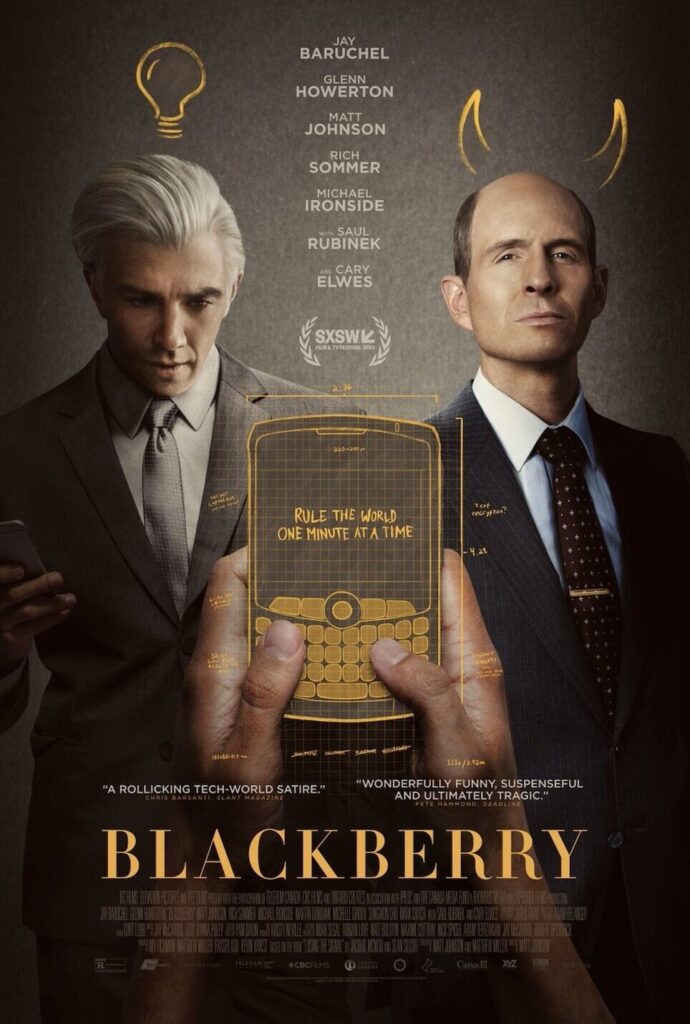
NUMBER 3 – BLACKBERRY
I don’t know what I was expecting with Blackberry but awesomeness was not on the list. Except that’s exactly what was served. Even if you liked nothing about this story, it’s impossible not to get caught up in Glen Howerton’s performance. I don’t know if the Academy has the balls to nominate him. He doesn’t fit what they’re looking for these days. But they should. And guess what? The story’s pretty good too. “Blackberry” is the tech industry remake of Titanic. We all know what happens to Blackberry. It hits an iceberg. So we have this dramatically ironic omniscient point-of-view which allows us to squirm in our seats as all the decisions are being made to position the company into being a global powerhouse. “Take Apple more seriously!” we scream. But they ignore us. Side note: If you can get your audience to yell at the screen, you’ve won. I love it when writers make cautionary tales fun. Cause most cautionary tales are just sad. This was fun because the supporting characters (especially Matt Johnson, who plays the co-founder) are so zany. And Howerton chews up so much scenery he gains ten pounds by the end of the film. Blackberry is like the cousin to Dumb Money. If you’re feeling down, throw these two in for a double-feature and I guarantee you’ll be smiling for the rest of the day.
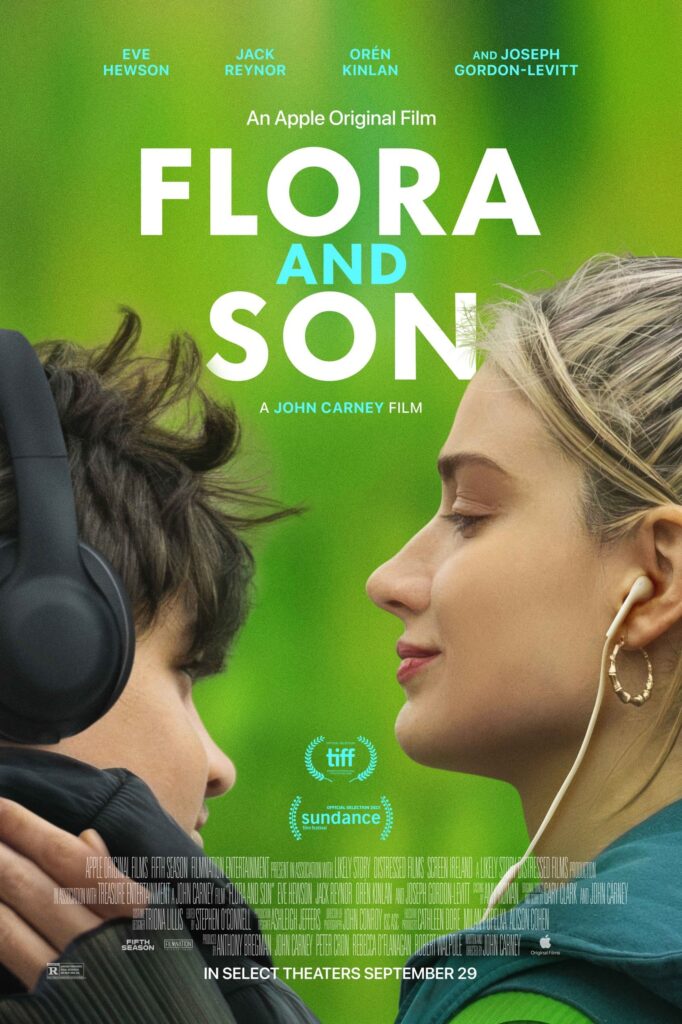
NUMBER 2 – FLORA AND SON
There isn’t a more feel-good movie this year than Flora and Son. John Carney is my new hero. He recognized that studios have spent the last five years making these divisive movies that piss half the audiences off. He realized that there was a market for making a movie for everyone. Flora and Son is about family. It’s about music. It’s about never giving up. It’s about trying new things. It’s about love. To be fair, a lot of movies try to be about these things. But what sets this film apart is Flora. Flora is a great character. Cause here’s the thing. When you make feel-good movies, the goal is not to make everything in the movie happy-happy. That’s not how you make people feel good. You have to show people the dark side in order for them to appreciate the light. There’s this early uncomfortable scene where Flora, who’s hired a hot online male guitarist from America to teach her guitar, listens to a song of his where he bares his soul. Afterwards, she asks him to sing it again, but this time with his shirt off. In other words, Flora is not perfect. She has some learning to do. But that’s what good movies are about. They’re about characters who learn. Who change. Watching Flora change into this better version of herself was the best character journey I watched all year. And, even if you don’t buy into any of that, it’s still a fun feel-good movie that’s perfect Christmas viewing.
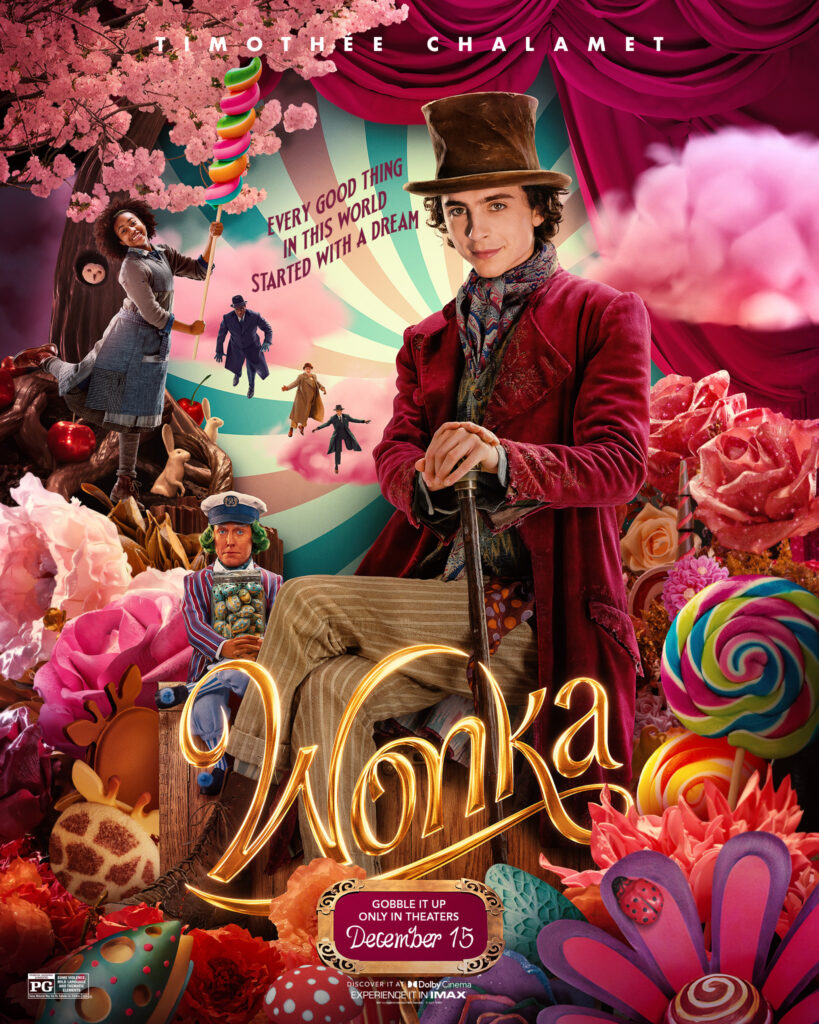
NUMBER 1A – WONKA
The reason this is 1a is because I didn’t see it until after I made this list and, therefore, had to fit it in. Because it’s THAT GOOD OF A MOVIE. I’m not saying this so I could look like the cool film Cinephile who likes films that are overlooked. This film blew me out of the water with how great the characters were, how simple the plot was, how elegantly that plot was executed. Here’s how good this film is. Timothee Chalamet, even though he’s got that one-in-a-million onscreen presence, isn’t over-the-moon good as Willy Wonka. And still the film is amazing. I can’t remember the last time I’ve watched a film where THIS MANY CHARACTERS popped. Every single character stands out. A lot of people will ask if it’s as good as the original. Probably not……… but it sure is close. Just because of the screenplay and characters alone. It’s that impressive.
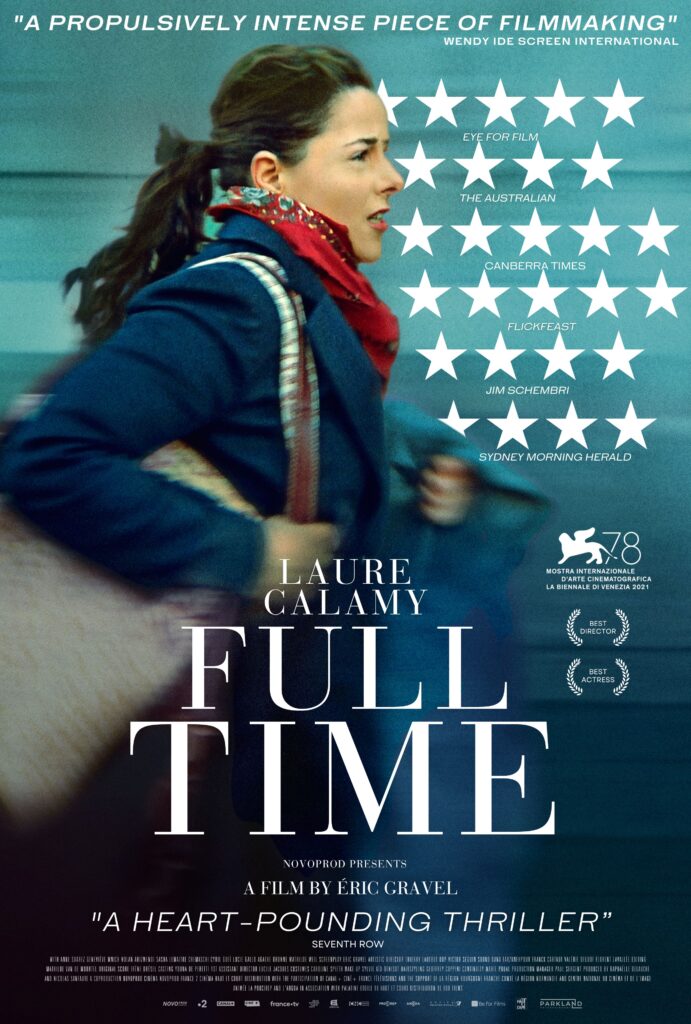
NUMBER 1 – FULL TIME
Full Time is an extremely simple movie. It’s about a mother who lives in the Paris suburbs who is hanging onto her hotel maid job in the city while raising two kids by herself. Then the train workers go on strike, preventing her from having an easy way into the city. Over the course of the next few days, this complication creates a chain of events that leaves her on the brink of losing everything. I’ve passively mentioned this movie a couple of times and a few of you pushed back, saying it was boring. I can’t imagine anyone thinking this movie was boring. You have all the Scriptshadow screenwriting staples in play. A main character we love because all she’s trying to do is support her family. She’s taken advantage of at work, which makes us like her even more. She tries to secure a better job, at the expense of losing this one. In other words, she’s an ACTIVE character. She’s not just passively waiting for the world to throw bad things at her. The stakes are enormous. She could lose her house if she gets fired. Her and her kids could be on the street. But the movie’s biggest advantage is its urgency. Every – Single – Day is a race. Cause she’s trying to get to work. If she’s not on time, she’ll get fired. So we always feel this desperation in the narrative. And that’s what I was most impressed by. It’s one thing to create tons of urgency in a movie about terrorists or superheroes or asteroids. For a writer to create this much urgency out of a woman just trying to get to work? That’s what blew me away. Not only creating that level of real-world urgency. But making us FEEL IT. The craziest thing is, I wouldn’t have even heard of this movie if my parents didn’t recommend it. I’m supposed to be on top of things. It just goes to show that there are gems out there. Which is why I now leave the voting in your hands. What gems did you find in 2023??
Scriptshadow turns to its own for today’s screenplay review, the runner-up in the November Logline Showdown! The Equalizer meets Nosferatu.
Genre: Horror/Action
Logline: An elderly shop owner in San Francisco’s Chinatown sacrifices himself to become a goeng-si–a Chinese hopping vampire–so that he can get revenge against the gangsters terrorizing his neighborhood.
About: Today’s script finished SECOND in the November Logline Showdown to The Mentor, losing to the therapy thriller by just a single vote!
Writer: Mark Steensland
Details: 95 pages
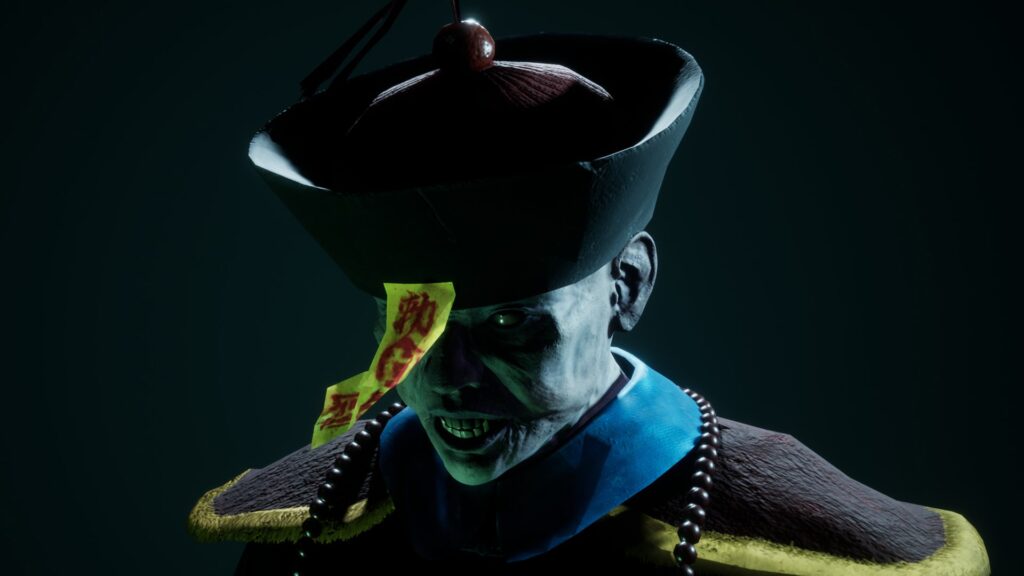
There were lots of fans of this logline. And since it was one of the more unique concepts I’ve seen on Logline Showdown, I had to review it.
72 year old Dai, a shop owner in Chinatown who sells special papers that you burn to connect with your ancestors, is running out of time. He’s got cancer of the lungs and it’s bad enough where he can’t hide it from his family anymore.
His granddaughter, 18 year old Susan, informs her father, Chen, and mother, Zhu, that grandad is ignoring his deteriorating health. Unfortunately, the family has other pressing issues to deal with. Three gangsters – Fang, Bin, and Ko – are demanding more money for “protection” of their shop. When Chen hems and haws, they slice his arm and say they’ll be back tomorrow.
The family tries to tell the cops but when Officer Poole comes by, he erases their security footage and encourages them to pay up. He’s obviously working with the gang. They’re all part of a bigger mafia outfit run by a dude named Han.
Dai realizes that, since he’s going to die anyway, he might as well go out with a bang. An old Chinese folk tale suggests that if you hold your breath while you’re dying, you turn into a goeng-si, a hopping vampire. So Dai confronts the gang and Officer Poole, forcing them to shoot him dead. He then holds his breath and turns into a hopping vampire.
Chen knows how the hopping vampire lore works. You can use something called a “fu” to place on their forehead to freeze them. This is what he does to his father. But Dai is still able to get away and kills the three gang members. This sets off a panic in Han’s operation except nobody inside the outfit can fathom that hopping vampires really exist.
When Susan recruits her boyfriend to take down the last member of the group – Officer Poole – she gets in over her head and Han kidnaps her. This forces Chen to make a trade with the mafia boss, a trade that will include an enraged Dai, who wreaks havoc on Han’s operation.
All us readers want is for you to give us a script that’s the same but different.
Is that too much to ask?
I, of course, ask this question tongue-in-cheek, because the age-old request is one of the most self-contradicting in existence. Nobody really knows what it means.
But if there was a concept that encapsulated this request, A Chinese Vampire Story would be it. We all know what vampires are. So that’s “the same” part. But we’ve never heard of a Chinese-hopping vampire. That’s the “different” part. Voila. You’ve now given Hollywood exactly what it wants.
The only catch is that “the different” part must be conceptually strong. I could make a romantic comedy with a fork and a spoon as the lead characters and call it “the same but different” but, conceptually, it’s too weird of a premise for anybody to care. So there is some nuance to this request. You have to find that “difference” that connects with the reader. A Chinese Vampire Story achieves that.
Kudos to Mark for doing something else I always say on this site: KEEP YOUR STORY SIMPLE. This script is as simple as it gets. Bad people are robbing struggling people of their hard-earned money and, therefore, we want to see them go down. That “going down” part comes in the form of a Chinese Hopping Vampire.
It’s not just the simplicity in the plot that I like. It’s the simplicity in how Mark gets the reader invested. One of the easiest ways to get readers invested is to stir up their emotions. You can do this in a positive way. You can do it in a negative way. However you do it, once we’re stirred up emotionally, WE CARE. If we care, we want to turn pages.
One of the easiest ways to stir up emotion is to create characters the reader likes then have bad characters take advantage of them. It’s such a simple formula yet so effective. When Fang, Bin, and Ko are stealing the hard-earned money of our struggling family, we are angry, and therefore committed, to seeing them go down.
Enter our Chinese Hopping Vampire. This is the script’s “strange attractor,” – the unique thing the reader is intrigued by and wants to learn more about. The Chinese Hopping Vampire attacks by hopping (obviously). All hopping vampires are blind. So they hunt by smelling peoples’ breath. Therefore, the only way to avoid an attack is to hold your breath.
The way to kill off a hopping vampire is to stuff sticky rice in their mouths. Which is how Chen kills Fang, Bin, and Ko when they become hopping vampires.
While I liked this script, I thought it could’ve done a few things better. For starters, we’ve got a main character problem. Who’s the main character here? It starts off being Dai. Then the implication is that it’s Susan. But then it’s Chen who commits to taking out the vampires. Then it’s Susan again, who wants to kill off the cop.
Yeah, you can call it an ensemble piece and jump from character to character if you want. But this feels like the kind of movie that needs an official lead. Go with Chen or Susan, whichever character you feel is more complex and interesting.
The biggest missed opportunity is not leaving one of the gang members (Fang, Bin, and Ko) alive as a hopping vampire. If you had a villain hopping vampire running around along with a ‘hero’ hopping vampire, there are more opportunities for things to get interesting, most notably having a vampire showdown at the end.
I also felt that Mark could’ve done more with the breath-holding stuff. I’m imagining a scene like the kids stuck in the kitchen with the velociraptors in Jurassic Park. Put our characters in a similarly confined room with Fang the Hopping Vampire, and make them hold their breath for a full three minutes as he sniffs around. That scene writes itself.
Finally, the second half of the script isn’t as good as the first half and that can’t be the case. The script loses something when all the gang members are killed. I think the solution is to give Officer Poole a partner – so there are two bad guys we still want to kill after the gang members die. And, also, make the Chinese Mafia Boss a much bigger personality in the script. He’s our top dog and, supposedly, the guy we should want to kill the most. But we barely know him so we don’t care. He needs to be more present and more evil.
Having said all that, this is a movie. I have no doubt about it. The writer needs to put his foot on the gas more. But if he can do that, I see no reason why this script couldn’t sell.
Oh! One more thing. This script needs a cold open. Start 200 years ago and show a hopping vampire do something crazy in a shadowy sequence. Or show a murder scene and when they open the person’s mouth, it’s filled with sticky rice, which creates mystery going forward.
Script link: A Chinese Vampire Story
[ ] What the hell did I just read?
[ ] wasn’t for me
[x] worth the read
[ ] impressive
[ ] genius
What I learned: Be careful about killing the villains we hate the most too early in your script. Once we feel that satisfaction, we’re not as invested in the story. Either keep one of the thugs alive, make Poole a lot worse, or make the mafia boss the worst guy ever. That way we’re still highly engaged and want our heroes to take these guys down.
The most clever horror premise I’ve read all year. It Follows meets The Ring!
Genre: Horror
Premise: A young woman finds out, after breaking up with her boyfriend, that everyone who breaks up with him dies exactly three days later.
About: The short story sales continue! In addition to “It’s Over,” we also have the new Ridley Scott short story project, “Bomb.” I’m trying to get my hands on that one as well so maybe I’ll be reviewing it soon. “It’s Over” sold for mid-six figures to Sony and will be adapted by Akela Cooper, who scripted, “M3GAN.”
Writer: Jack Follman
Details: 28 pages
 Prey’s Amber Midthunder for Jen?
Prey’s Amber Midthunder for Jen?
Short stories taking over Hollywood. Who would’ve thought?
I wonder if the reason these things are selling is because Hollywood realized they were going to rewrite any spec sales anyway. So why not substitute in a piece of writing that allows them to craft the script from conception? There is no script with a short story so you can build the building however you want, as opposed to having to redesign it, which can be deceivingly difficult.
Jen has been with Lucas for five years. The two began dating in college and Jen is finally realizing that they were in a relationship of convenience. She doesn’t love him anymore. Therefore, it’s time to break up. So she meets with him, tells him it’s over, and gets the shock of her life.
Lucas says she can’t break up with him. “Why?” She asks. “Cause you’ll die. Every girl who has ever broken up with me dies exactly 3 days later.” Jen is weirded out, and after arguing with Lucas about this insane statement, she heads over to her best friend, Maggie’s, house for some girl support.
She’s shocked to find Maggie wasted, and after picking up her computer, sees e-mails between Maggie and Lucas. Maggie ended their illicit affair a couple of days ago and he’s been trying to get her back ever since. After screaming at her best friend, Jen storms out, only to hear, seconds later, something dreadful happen to Maggie. When she opens the door, Maggie is dead.
The police bring Jen in and are none too convinced that she didn’t have something to do with Maggie’s death, seeing as she had ample motivation to remove her from the planet. But now Jen knows that there may be something to this whole 3-day curse and hurries back to Lucas to get back together with him, at least until she can figure out what the heck is going on. Except Lucas has bad news. “It doesn’t work that way,” he says. Even if they get back together, Jen is already on the clock. In less than 2 days, she’ll be DEAD.

I want to highlight the importance for writers of choosing a concept. Because I looked Jack Follman up and saw that he had one other credit. It was for a movie called “Snorkeling.” Here’s the description for that film: “An authentic coming-of-age film about love, addiction, and mental health. A young couple tries a new hallucinogenic street drug called Snorkeling which explores the highs, and ultimate tragedy, of drug dependency, via a unique journey of adolescent self-discovery.”
Okay, now here’s the description of today’s story: “A young woman finds out, after breaking up with her boyfriend, that everyone who breaks up with him dies exactly three days later.”
I’m placing the producer hat on you right now. You have 10 million dollars. You HAVE to make a movie this year. The above two movies are your only choices. Which one do you make? Is it even a question? Of course you pick “It’s Over.” “It’s Over” is 100 times more marketable – not an exaggeration – than “Snorkeling.” If you don’t understand why, I guarantee you, you’re picking bad ideas to write about.
I’m not saying Snorkeling can’t be a movie. I’m saying that this business is hard enough even when all the factors are in your favor. So why not pick a concept that has wide appeal? That gives you a chance to break out?
It’s Over is one of the better concepts I’ve come across all year. It’s “It Follows” meets “The Ring.” What a great salable combo. Oh, and one other thing, IT’S INCREDIBLY CHEAP TO MAKE. I can’t imagine a scenario where this DIDN’T sell. That’s how perfect of a concept it is.
The great thing about a great concept is that all you have to do is not screw up the execution. Contrary to popular belief, you don’t have to write a great story. You only have to write a great story if you have a concept like “Snorkeling.” But with great concepts, the producers, in a lot of cases, are already leaning towards buying your script/story before they’ve read it. Cause they know how movie marketing works and they know that this is a concept they can sell to audiences.
It’s Over starts out great.
I’ve been doing a lot of consultations lately, which allows me to see things more clearly. It’s easier for me to notice patterns when I’m consistently analyzing scripts. One of the things I’ve been noticing is that writers aren’t taking advantage of their concepts enough.
They’re writing up the kinds of scenes (and scenarios) that can be in any movie as opposed to asking themselves, “How can I write scenarios that specifically take advantage of my unique concept?” The more you do that, the more your story will stand out from the pack.
There’s a great example of that here. Jen’s best friend, Maggie, has been sleeping with her boyfriend. Now, we’ve seen friends sleeping with character’s boyfriends in a lot of movies, right? This is not a new plot development.
However, within the construct of this premise, it’s the perfect development. Cause what it means is that Maggie and Lucas were in a relationship. Therefore, if she just ended it with him, that means she will die. This works as a catalyst to solidify to Jen that what Lucas is saying is real. Cause when Maggie dies, that’s proof he was being truthful.
As soon as I read that scene, I knew, “This writer gets it.” More writers need to do this. I’m telling you – you get so much more mileage out of your screenplays when you do.
So I was upset when, later on, Jen gets stuck in a bathroom and hides in one of the stalls, and the evil “It’s Over” beast starts kicking down the stalls one by one. It’s a scary scenario, sure. But this WAS NOT a scene specific to this premise. This scene can literally be in any horror movie out there (and is). So it doesn’t work the way the Maggie reveal does.
It’s a reminder to keep pushing yourself. Don’t pat yourself on the back after the Maggie reveal and say, “I’m good now.” Keep trying to come up with scenarios that take advantage of your specific premise. That tip is creeping into my top 10 all-time screenwriting tips. That’s how important it is. And yet very few writers actually do it.
The rest of It’s Over does a decent job wrapping up the story but it’s one of those deals where the couple has to go find someone who started the curse and figure out how to reverse it. That scenario needs time to breathe and, unfortunately, short stories are good for letting things breathe. You have to wrap stuff up quicker. You can feel that pinch as Follman attempts to do it. Still, the execution is more than adequate.
There are a lot of sales in Hollywood that make you scratch your head. This is not one of them. This is the sale you read and you go, “Yeah, I know exactly why that sold.”
[ ] What the hell did I just read?
[ ] wasn’t for me
[xx] worth the read
[ ] impressive
[ ] genius
What I learned: If a scary scene you just wrote can appear in any horror movie, you need to get rid of it and replace it with a scene that can only happen in your specific movie due to your specific premise.
How did one of my most anticipated films of the year hold up to all that expectation??
Genre: War/Drama/Period
Premise: A wealthy German family goes about their daily lives living several feet away from the Auschwitz concentration camp during World War 2.
About: This film won the esteemed Grand Prix at the Cannes film festival. Director Jonathan Glazer wanted things to feel so realistic in his film that he set up 10 cameras throughout the home his characters lived in and would do 90 minute takes where the characters would just walk around the house and improvise lines.
Writer: Jonathan Glazer (based on the novel by Martin Amis)
Details: 1 hour and 45 minutes (feels like 5 hours and 45 minutes)

It’s the holiday season.
What better way to celebrate than with a Holocaust movie!?
I’ve been looking forward to this film ever since I heard about it. The premise was so unique. A family living happy unburdened lives several feet from the most death-centric piece of land in human history. The irony was irresistible. People have called it the best horror film of the year.
Well, I checked it out this weekend and, long story short, I’d imagine some forms of heart surgery are more enjoyable than this piece of cinematic torture. I’m canceling the French for endorsing this.
But I’m not going to spend the entire review ripping on it because nobody here is going to see it so what would be the point? Instead, I want to use the film to remind screenwriters of a handful of key screenwriting tips. Because The Zone of Interest is what happens when you ignore the power of good storytelling.
I was debating whether to even write a synopsis for the film since so little happens. But for the sake of context, we follow a family (a father, a mother, and their four young children) who literally live right up against the Auschwitz wall. It turns out that the father is the head administrator of Auschwitz.
The movie follows them through their mundane daily activities, eating or playing in the backyard. The father, Rudolf, who, oddly, is the nicest person in the family, is stressed out by the burden of running his camp. Later in the movie, orders come down to transfer him to another camp. His family stays at the house, though. The climax is Rudolf learning that they need him back at Auschwitz, allowing him to reunite with his family.
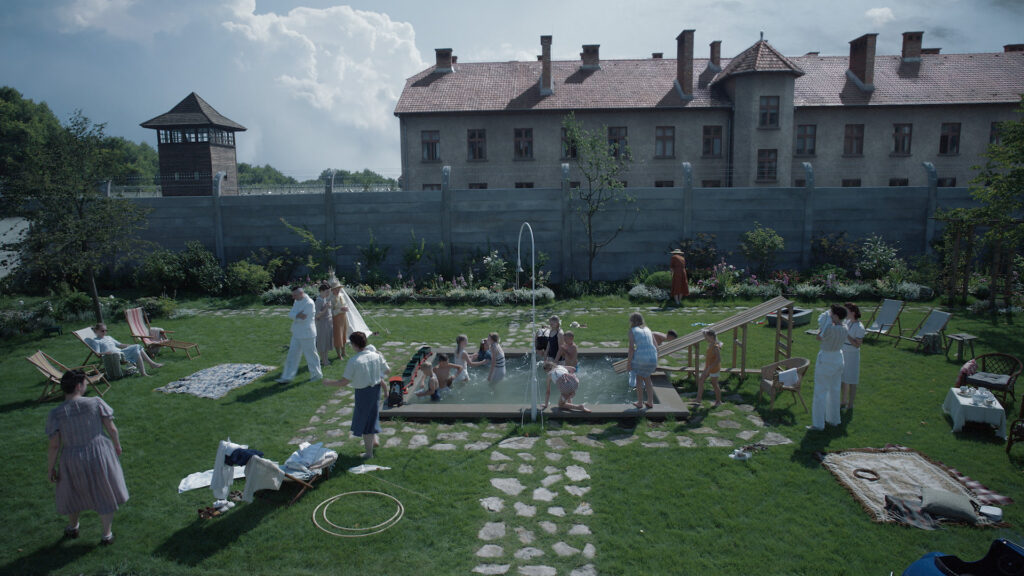
By the way, I’m being SUUUUUUUPER generous by making that sound like an actual story. Everything that happens in the script does so randomly. There’s no design behind anything. It’s as if writer Jonathan Glazer threw darts at a dart board for which scenes to write next.
Screenwriting Tip #1: The novelty of your concept runs out quickly. Have a plan for what follows.
The film’s best attribute is the horror that’s happening off screen. We hear the screams. We hear the cries. We hear the gunshots. We see the smoke coming out of the incinerators.
The problem is, the novelty wears off quickly. We get the message in the first ten minutes. With that not working for your movie anymore, what’s your plan to keep us invested? You didn’t have one. You were hoping the off-screen horror would do the lion’s share of the work.
This issue is true for every screenplay. The reader comes for the concept. But the novelty of the concept gets old quickly. Which means you have to come up with an entertaining plot. You have to create compelling characters we want to follow. You have to tell a good story. You can’t rely solely on the concept that got the audience in the door.
Otherwise, make a short film. Which is what Zone of Interest should’ve been.
Screenwriting Tip #2 – Subtlety does not make your script deeper. It makes it more confusing.
The big mistake so many drama writers make is that in their determination to avoid being on-the-nose, they go in the opposite direction and make everything super subtle. These writers then seem surprised when audiences miss key story beats or character motivations.
Rudolf spends the majority of this movie staring off into the distance looking stressed. While Glazer may know what Rudolf’s thinking, how the heck are we supposed to know? Are we mind-readers? This is the problem with being too subtle. We have to guess Rudolf’s thoughts, which means we’re deviating from your, the writer’s, intent.
Is Rudolf scared? Does he feel bad about what he’s doing? Does he want to keep rising in the German ranks? Or is he satisfied with where he stands? We never know ANYTHING because Rudolf never speaks to other characters about how he feels.
Rudolf is just one example of the excessive subtlety in the film. One of the maids may be Jewish. There are subtle hints that this is the case. But we’re never certain. We don’t know if she’s Jewish but pretending not to be. Or if she’s Jewish and the family is aware but letting her work anyway?
Note how either of those scenarios are fertile ground to explore drama. But Glazer ignores both. That’s a running theme throughout this movie. There were so many opportunities to make this a compelling story that were ignored in favor of vagaries and subtleties.
Be clear about things when you’re storytelling. There are times when you want to be subtle, yes. But subtlety only works if we are clear about everything else surrounding the subtlety.
Screenwriting Tip #3 – Put some stakes behind your big plot points.
A major plot point only works if there are stakes supporting it. The lone plot point in this movie is that Rudolf gets transferred. But there are zero stakes attached to it other than he’s going to be traveling away from his family. In a movie about the holocaust, the audience isn’t going to care that the main character is inconvenienced. You need real stakes built into that plot point for it to be effective.
Maybe Rudolf made some major blunder at work, screwing something up enough that it’s being reported to Hitler. The implication is that, if Hitler feels the mistake is bad enough, Rudolf could lose everything. He and his family would be removed from this cushy lifestyle and relocated to some ghetto. You would then play that suspense out over 30-40 minutes. He’s waiting on that decision from Hitler that’s going to determine the rest of his life. That one single change would’ve made this movie five times as interesting.
Without stakes, plot points are lip service. They make it seem like something is happening but the audience doesn’t care because there are no repercussions.
Screenwriting Tip #4 – It’s cause and effect, not effect and cause
This seems obvious to me but I guess Glazer never got the memo. You need to show the cause first AND THEN THE EFFECT. Not vice versa.
A little after the midpoint, Rudolf goes in for a checkup from the doctor. The doctor gives him a basic exam to make sure everything is in order. Then, later on in the film, Rudolf is walking through a building, doubles over, and starts having intense vomiting episodes. It comes out of nowhere (more vagueness instead of clarity). The movie ends quickly afterward.
Consider how much better for the story this would’ve been if they’d shown the vomiting (the cause) first. Now you can draw out the suspense. Does he have a disease? Now that same doctor’s visit (the effect) has more meaning to it. They could find out he’s really sick.
This is Drama 101 but it wasn’t until I saw this movie that I realized some people are so ignorant when it comes to storytelling that they don’t understand the most basic tenets of the trade.
Screenwriting Tip #5 – It’s not “All or Nothing.”
Too many writers think that when they’re writing big Hollywood movies, they should be as big and surface-level as possible all the time. The same problem happens with indie writers. They’re so terrified of betraying their indie sensibilities, they won’t give you a single entertaining plot development in the screenplay.
It’s okay to add thoughtful character development to big blockbuster scripts just as it’s okay to write in entertaining plot developments into your holocaust film. It’s never all or nothing.
In retrospect, I should’ve known The Zone of Interest would be bad. Jonathan Glazer is so artsy, even indie directors find his films pretentious.
Still, I’m left with a longing for what could’ve been. There were so many interesting ways for this story to go. For example, the longer the story goes on, the more we like Rudolf. There’s something borderline sweet about him we connect to. Meanwhile, the wife, Hedwig, becomes less and less likable as the story continues, at one point lashing out at one of the maids by saying her husband could have her ashes scattered all over Auschwitz by tomorrow.
That could’ve been an interesting character study had Glazer committed to it. We think that Rudolf is the monster. But we learn, over time, that Hedwig is the true monster. She’s the one steering the ship from behind the scenes.
Alas, Glazer doesn’t have a single writing bone in his body. It’s too bad. Cause this film could’ve won numerous Oscars if he did.
[x] What the hell did I just watch?
[ ] wasn’t for me
[ ] worth the price of admission
[ ] impressive
[ ] genius
What I learned: While audiences do enjoy doing *some work* in a movie, they don’t enjoy doing *all the work*. If you don’t tell us anything about the characters, if you don’t give us any interesting plot developments, if every scene is too subtle to decode, and you’re hoping we, the audience, will put all that together and come up with some profound feeling about your film for you, you’ve failed. That’s not our job. You have to do the majority of the work as the creator to get us to feel something.

